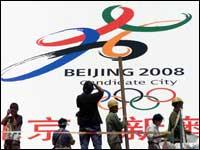Transcript
BOB GARFIELD:
This is On the Media. I'm Bob Garfield.
BROOKE GLADSTONE:
And I'm Brooke Gladstone. This week starts the one-year countdown clock to the first-ever Olympics in China. Opening ceremonies will commence on August 8th, 2008, but questions remain as to whether international standards will be met for conditions on the ground, from smog to human rights.
This week alone, Reporters Without Borders called for the release of about 100 journalists, cyber-dissidents and free speech activists in China. Human Rights Watch released a report called You Will Be Harassed and Detained: Media Freedoms Under Assault in China Ahead of the 2008 Beijing Olympics Games.
And a group from the Committee to Protect Journalists went to Beijing to release their report, titled Falling Short: As the 2008 Olympics Approach, China Falters on Press Freedom.
Jocelyn Ford has reported from China since 2001. She heads the Professionalism Committee for the Foreign Correspondents Club of China. They just released their second survey assessing whether China is ready to receive some 20,000 foreign journalists to cover the Olympics. Jocelyn, welcome back to OTM.
JOCELYN FORD:
Thanks.
BROOKE GLADSTONE:
So let's go back to the first survey a year ago. On what grounds did the survey deem China unready for the world's sporting press?
JOCELYN FORD:
China has agreed to allow foreign media to come and report freely during the Olympics. And what we found last year was that there were an awful lot of detentions of foreign correspondents. There was a level of violence that is clearly unacceptable. We had — one cameraman was sent to the hospital because he was attacked by a security guy for taking a photograph. We had 57 cases of intimidation of sources.
One source was paralyzed after he spoke to the foreign media. He was shoved down a slope, and we will never know who exactly did it, but he believes it was the security police who he had spoken to about talking to the foreign media. And shortly after he left them, this tumble occurred.
BROOKE GLADSTONE:
On the other hand, the new survey says that 40 percent of the people that you interviewed, the foreign correspondents working in China, think conditions have improved, overall.
JOCELYN FORD:
That's true. Before January 1st this year, every time I wanted to report in another city, officially I was supposed to go to the local government in that city and ask permission. Now, of course, what happens is if you're going out to cover a protest or a social problem, the local government won’t say, of course, you cannot come. So we never did that. [LAUGHS] It was sort of like cat and mouse.
We would sneak around the country, watching our backside to see whether there were officials behind us, whether we would be thrown out of the area or not. And that has eased up somewhat.
BROOKE GLADSTONE:
Do you think it's because it is now really close to the Olympics, whereas last year it really wasn't?
JOCELYN FORD:
Well, this is very clearly the case. The Chinese government has lifted those restrictions on a temporary basis only through the end of the Olympics.
The purpose of hosting the Olympics is sort of like a coming-out party. You have a big opportunity to invite the world press to your country and say, look at our achievements. Look what we're doing. Well, if they go around and arrest [LAUGHS] half the reporters or any number, that'll become a big headline and it will not serve their purposes.
So they realized, I believe last year, that some change was necessary. In addition, of course, they had already promised the International Olympic Committee that they would allow free reporting of the Olympics, though that was a rather vague - you know, there's nothing specific about what they considered free reporting or what the International Olympic Committee considered free reporting.
And let me add here that the International Olympic Committee and all the sponsors, the corporate sponsors of the Olympics, have a lot at stake as well, having the Olympics go well. They do not want to be in a position, I believe, to say, you know, see, foreign correspondents arrested and all that so to speak. So -
BROOKE GLADSTONE:
[LAUGHS] And this event brought to you by Pepsi.
JOCELYN FORD:
Exactly.
BROOKE GLADSTONE:
Recently it was reported in the Sunday New York Times that China had hired Western public relations people to help them with their image problem related to tainted consumer goods. And I just wonder, given this big public relations effort, would part of that perhaps include easing up on the foreign press working in China?
JOCELYN FORD:
We don't know what these people really think about a freer media, but I suspect that they have not been convinced at all that a free foreign media is in their interest. For the Olympics, I have been told by sources that they may be trying to infiltrate foreign news organizations. They train people who might be able to assist English speakers when they go to the country or people in other languages, and some of those people may also be reporting on the activities of the reporter they're helping, for example.
That happens regularly with us. Our staff is occasionally called in by public security officials to find out what we're up to. But I do not think the government is convinced that a free foreign media is in their interest.
BROOKE GLADSTONE:
Well, Jocelyn, all I can say then is let the games begin.
JOCELYN FORD:
[LAUGHS] Let them begin, and after they end, don't stop watching.
BROOKE GLADSTONE:
Beijing correspondent Jocelyn Ford. Thanks, Jocelyn.
JOCELYN FORD:
Thank you.
[MUSIC UP AND UNDER]

